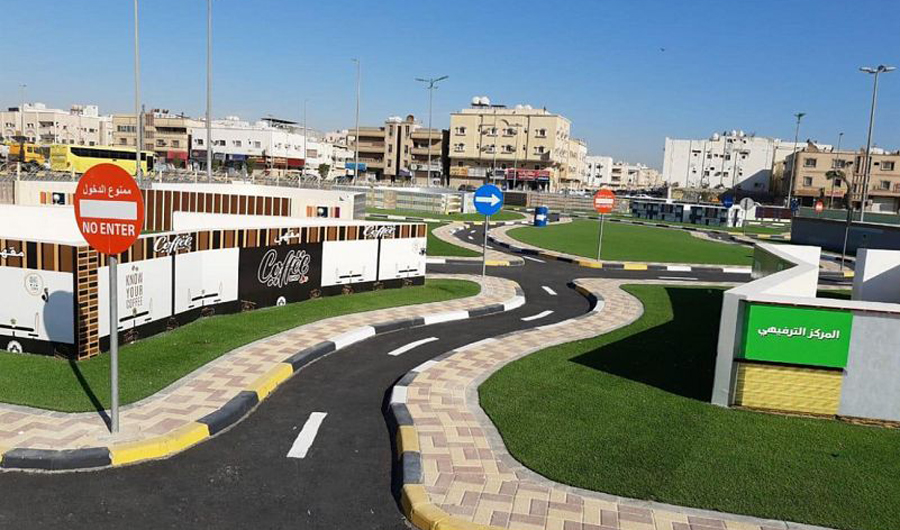What Are The 13 Provinces Of Saudi Arabia The Saudi legislature has taken a major step forward in modernizing the Saudi judicial system. For the first time in the Kingdom's history, a High Court has been established in its capital, Riyadh, as the highest judicial authority in the land assuming responsibilities that were previously assigned to the Supreme Judicial Council. It exercises its authority through criminal and other specialized circuits. The Supreme Judicial Council oversees the administrative aspects of the judiciary, including the selection of judges, oversight of judges' personal affairs and the establishment of specialized courts, etc.
The 2007 Law of the Judiciary established courts of appeal in all 13 provinces, thereby increasing the speed with which disputes are resolved and making the delivery of appellate rulings more efficient by distributing their caseload among specialized labour, commercial, criminal, personal status and civil circuits. Labour, commercial, general, personal status and criminal courts are also being established throughout the Kingdom with full jurisdiction within their areas of specialization. The current judicial system has jurisdiction over most of the civil, commercial and criminal disputes previously heard by the administrative committees. The commercial circuits of the first-instance and appellate courts of the Board of Grievances are in the process of being transferred (with all their judges, cases, etc.) to the new judicial system's first-degree and appellate commercial courts.
In addition, the Council of Ministers' Bureau of Experts has established a committee to review, and propose due amendment of, all laws and regulations affected by this transition. As required by the implementing regulations of the Laws of the Judiciary and the Board of Grievances, the Supreme Judicial Council is studying the situation of the administrative committees exempted from this transition in order to complete the regulatory procedures. The Law of the Judiciary of 2007 introduced courts of appeal as a safeguard, empowering them to overturn decisions of lower courts. The Law provides for the establishment of one or more courts of appeal in each of the Kingdom's provinces. Each court functions through specialized circuits comprising three-judge panels, except for the criminal division which reviews judgments in cases involving certain major offences, including those carrying qisas, hudud and ta'zir penalties. Courts of appeal consist of labour, commercial, criminal, personal status and civil circuits.Specialized appeal circuits may be established in the districts of each province in which a court of appeal is located.
Each division is composed of a chief justice, appointed by the president of the court, and members holding the rank of appellate judge. In addition to the two courts in Riyadh and Makkah, the Ministry of Justice is opening 11 new courts of appeal in other provinces. First-degree courts are being established in the Kingdom's provinces, governorates and districts in accordance with the needs of the system.
First-degree courts consist of general, criminal, commercial, labour and personal status courts and comprise specialized circuits including enforcement, approval and traffic circuits. They are composed of single- or three-judge benches as specified by the Supreme Judicial Council. The Saudi Courts of Appeal were the second tier in the previous Saudi Arabian "ordinary judicial system." A Court of Appeal was composed of a chief justice and a sufficient number of senior judges from the legal community.
The Court consisted of several panels with jurisdiction in criminal, personal status and other cases not falling within the other two categories. The Court of Appeal was empowered to establish as many panels as it needed and these panels were presided over by the chief justice or one of his deputies.Previously, there were two Courts of Appeal in Saudi Arabia. One was in Makkah, which heard appeals from the lower courts in the western provinces, while the other was in Riyadh, which heard appeals from the lower courts in the central and eastern provinces. However, in the public interest and on the basis of a decision of the Court's General Council, some of the panels used to hold all or part of their hearings in another city or establish branches in other cities. As the Islamic Shari'ah is the main authority for Saudi courts, a judge is required to have a high level of education, knowledge and understanding of socio-cultural issues and must be equipped with the tools of ijtihad, as well as specific professional skills that will lead to reasonable, fair and impartial judgments. The Law of the Judiciary requires each judicial candidate to hold a degree from one of the Shari'ah colleges in the Kingdom of Saudi Arabia.
According to the Saudi ulama, the purpose of such education in Saudi universities is to produceulama capable of varying degrees of ijtihad. A candidate may hold an equivalent certificate, although he is required to pass a special examination set by the Supreme Judicial Council. To enable judges to attain the highest levels of education, the Kingdom has established a Judicial Academy and an Institute of Public Administration to train judges, enhance their expertise, develop their skills and provide them with the information that they need in order to function effectively. In 1927, a Royal Decree inaugurated a relatively modern and sophisticated system of courts ‑ incorporating, for example, multiple-judge courts and regular appeals — which operated in the cities of Makkah, Madinah and Jeddah.
Several Royal Orders were subsequently issued to regulate various aspects of the Shari'ah courts. A Royal Order issued in 1931 included provisions regulating court procedure. This Law comprised 282 articles regulating in detail the Shari'ah courts, their types, their jurisdiction and their judgeships. Later, between 1956 and 1960, the jurisdiction of the court system was extended to the entire country, thereby standardizing the national judicial system.
More specifically, in 1957, King Sa'ud implemented a judicial reorganization throughout the realm to parallel that found in Makkah, Madinah, and Jeddah. In 1960, he unified the two systems under the Presidency of the Judiciary in Riyadh, which extended the regulations developed for a few cities to the entire country. This was part of the nationwide administrative unification that King Abdulaziz had set in motion when he ordered the creation of the Council of Ministers just before his death on 11 November 1953. In 1970, a Ministry of Justice was created by King Faisal to administer the country's courts. From 1970 to 1975, a modern administrative system for the courts was created in accordance with the Law of the Judiciary adopted in 1975, which contained several sections covering various aspects of the current judicial system; this will be examined later in the present study.
The revitalization of Saudi Arabia's judicial system reflects the nation's adaptability to modern developments without compromising its religious and cultural values. On 1 October 2007, King Abdullah issued Royal Decrees approving an overhaul of Saudi Arabia's judicial system. The Law of the Judiciary established a High Court, which took over the functions of the Supreme Judicial Council as the highest judicial authority in the Kingdom. Another important change was the establishment of appellate courts in each province. The law made provision for specialized labour, commercial, criminal, personal status and civil courts, which are currently being established in areas, regions and centres as needed.
Some of these courts are now hearing disputes that had previously been brought before special administrative committees. Quasi-judicial committees differ in nature from the ordinary courts insofar as they are not answerable to the judicial authority, their rulings are not subject to review by the High Court and their judges are not subject to judicial inspection or the mechanism for selecting and appointing judges. Despite the fact that the Supreme Judicial Council has recently taken steps to create enforcement courts to give effect to the decisions of quasi-judicial committees, their differing status makes it hard for other countries to recognize their jurisdiction or implement their rulings. It is therefore evident that the Board of Grievances is continuing to handle administrative disputes involving government departments. It is important to note that the previous Law of the Board of Grievances, adopted in 1982, empowered the Board to hear and punish offences involving bribery, forgery, exploitation of official influence or abuse of authority in criminal prosecution proceedings, or violations of human rights. However, under the Law of the Board of Grievances of 2007, the Board's jurisdiction over criminal offences that had been granted by the Law of 1982 was relinquished to the current Ordinary Court System.
On 19 August 2014, Saudi Arabia's Ministry of Justice inaugurated personal status courts, the first in a series of specialized courts, in major cities including Riyadh, Makkah, Jeddah, Madinah and Dammam as part of the Kingdom's efforts to modernize its judicial system. These courts will not, however, review litigation proceedings, which will remain under the purview of the general courts. The Ministry also established 88 single-judge circuits in all of the Kingdom's provinces. These courts and circuits are staffed by judges who have received extra training in cases involving divorce, alimony and child custody. General courts in the governorates without district courts have jurisdiction over all lawsuits, cases and the like which are subject to the jurisdiction of such district courts unless otherwise decided by the Supreme Judicial Council. General courts in governorates and districts consist of one or more specialized circuits, according to the needs of the system, comprising one or more judges as specified by the Supreme Judicial Council.
Specialized criminal, personal status, commercial and labour circuits may be established in general courts in governorates and districts where no specialized courts have been established.Moreover, where necessary, the Supreme Judicial Council may assign one or more circuits to hear pilgrims' cases. In cases other than those requiring a visit to the site of a dispute, courts should not hold their hearings in places other than their respective premises. One major step in the Ministry's efforts was the launch of the " NAJIZ" online portal in 177 first-instance courts in all regions of the Kingdom. The portal forms part of the endeavours being made to standardize judicial proceedings and apply digital transformation to institutionalize the judiciary and speed up the litigation process. The new portal was set up after restructuring the procedures adopted in all the courts in the Kingdom, and a new judicial procedural system document was drawn up and digitized. The system included launching approximately 120 services such as the "appeal without transcript" that enables first-instance courts to send the case file to the court of appeal electronically in just a few minutes and automatically receive a reply.
The "NAJIZ" portal was also designed to restructure proceedings and task forces were formed to study the proceedings of the courts and compare them with legal proceedings, criminal court proceedings and related regulations in other countries. The number of beneficiaries who utilized the portal exceeded 1,090,000 and the number of visitors amounted to about 42,000 daily. The Ministry produced an interactive manual to access "NAJIZ" services which included guidance to access services in all of the Ministry's judicial, enforcement and verification sectors.
The Ministry of Justice was preparing to inaugurate labour courts in 2017. The Committee on the Implementation of the Law of the Judiciary is carefully reviewing the rules of procedure of these courts to ensure that they are properly implemented. The labour courts will be established in cooperation with the Ministry of Labour and a specialized committee will train employees and judges and allocate buildings for these courts in accordance with Ministry of Labour studies and directives. Five labour courts will be opened in major cities, including Riyadh, Makkah, Jeddah, Madinah and Dammam, with 34 labour circuits in general courts in other cities throughout the Kingdom. Although Saudi judges generally adhere to the Hanbali school of law, they theoretically enjoy a certain degree of discretion in adjudicating cases and are constrained solely by their own conscience in determining the will of God.
Saudi judges apply "ijtihad" to reach decisions in cases not covered by the provisions of the Shari'ah. In such cases, they apply Islamic jurisprudential tools (e.g. analogy) to the sacred sources. In addition to the rules of the Islamic Shari'ah, a vast range of statutory laws have been enacted in criminal, administrative and commercial fields as required by the Kingdom's development. The 2007 Law of the Board of Grievances led to the establishment of similar departments, consisting of a director, several judges, professionals and researchers. These departments provide opinions, conduct research projects, classify Board judgments, general rules and precedents and prepare them for publication. The implementing regulations of the Law of the Board of Grievances also established a Research and Studies Department in the High Administrative Court consisting of researchers whose role is to prepare studies requested by the High Administrative Court's specialized circuits.
The Board of Grievances has issued a fourth edition of its Code of Rulings and Principles , records of court decisions rendered in 2008 under its mandate. Criminal courts exist in most of the Kingdom's administrative regions and governorates. In 2016, the Supreme Judicial Council issued a decision approving the organization and structure of the criminal courts and the mechanism for transferring criminal circuits in the Board of Grievances to the ordinary court system. In its efforts to promote the use of commercial paper and provide the requisite protection for its holders, the Supreme Judicial Council issued its circular N0.
998/T of 4 December 2017 which specifies that the criminal courts will have jurisdiction over commercial paper disputes relating to public rights which would normally result in either monetary penalties or imprisonment. Previously, the Commercial Paper Committees had jurisdiction over such disputes.The Supreme Judicial Council has designated 17 criminal courts to hear commercial paper disputes. An increasing number of disputes between government agencies and private contractors led to the creation of the Board of Grievances, which closely resembled the Conseil d'Etat in France, being the Supreme Court for administrative justice. It was first formed as a department of the Council of Ministers pursuant to the latter's Law.
The Board of Grievances had the authority to receive and investigate complaints, after which it would submit its report on the facts and circumstances surrounding each complaint, together with its recommendations, to the government minister concerned. Within two weeks of his receipt of the report, the minister was required to respond to the Board. If he did not accept the Board's recommendations, the Board would refer the matter to the King, who had the final decision on the matter.
At a later date, the Board was assigned jurisdiction in disputes of a criminal nature such as bribery and commercial fraud, which transformed the Board's function from administrative and investigative to judicial and adjudicative. In 1967, the King issued a Royal Order according the Board judicial independence from the Shari'ah court system. The Order stipulated that no lawsuit against a government agency should be heard by any Shari'ah court without the King's consent.
In addition, on 10 December 2014, King Abdullah issued a Royal Order establishing a committee to design a project for the compilation of a Code of Judicial Rulings on legal cases and issues, classified by Islamic jurisprudential category, to meet the needs of the judiciary. The committee, located in the Ministry of Justice, is empowered to request the assistance of experts, researchers on Islamic jurisprudence and members of the judiciary to provide it with research works and studies on Islamic jurisprudence and judicial precedents. The committee is required to adhere to the rules of the Islamic Shari'ah and follow a scientific approach in weighting the opinions of the Islamic schools of law.
All the codified material must be supported by evidence from Shari'ah texts and the " ijtihad," of religious-legal scholars. The Royal Order confirmed the committee's independence and gave it 180 days to accomplish its task. The committee split the work among three subcommittees, consisting of distinguished judges specialized in criminal, personal status and private law, and requested the Royal Court to extend the deadline for completion of its task due to the complex nature of the work. Many scholars view the Royal Decree as a major step towards a definitive codification of laws and penalties in the Islamic Shari'ah and the project is regarded as part of the major overhaul of the country's legal system initiated three years ago by King Abdullah.
The implementing regulations of the 2007 Law of the Judiciary also provided for a Research and Studies Department in the High Court consisting of researchers who prepare studies requested by the specialized circuits of the High Court. So far, the Ministry of Justice has published a third edition of its Code of Judicial Rulings , records of court cases in 2008, which appear to be considered binding precedents for similar cases in the future. It serves a useful purpose in cutting down on the number of sometimes apparently random judgments coming from some of the courts.
The administrative authority's refusal or failure to take a decision required of it in accordance with the laws and regulations shall be deemed an administrative decision. Besides the judiciary and the Board of Grievances , there are a number of committees linked to the Executive Branch with judicial power and jurisdiction to settle various commercial, criminal and civil disputes. These committees are established under the supervision of agencies or authorities created by the Executive Branch. The jurisdiction of each committee is always determined by its constituting decree or from the enforcement of particular laws which often contain articles establishing these committees and organizing their jurisdiction and functions. The Executive Branch exercises a wide range of discretionary authority over these committees. Therefore, these committees are not sufficiently independent due to the fact that the head of the agency may exercise a wide range of discretionary authority over a committee in a way that could affect its decisions.
The Board of Grievances consists of a President holding ministerial rank, at least one Vice-President, a number of Assistant Vice-Presidents and several judges.Vice-Presidents are appointed by Royal Order from among persons possessing the qualifications required to become chief justice of an appellate court. The Administrative Judicial Council performs several administrative functions similar to those of the Supreme Judicial Council. The Council meets every two months; its meetings are valid if attended by at least five of its members and decisions of the Council are adopted by majority vote.
It has established several committees, including the Jurisdictional Conflict Committee and the Judicial Disciplinary Committee, and a Judicial Inspection Department. As previously mentioned, article 9 of the Law of the Judiciary of 2007 permits the Supreme Judicial Council to establish specialized courts subject to approval by the King. The Minister of Justice issued order No. 1422 of 29 January 2008, based on Supreme Judicial Council resolution No. 4/69 of 7 January 2008, establishing a specialized criminal court in the city of Riyadh to try suspects in cases involving terrorism, national security and other related offences. The court's panels consist of a single judge or three judges as determined by the Supreme Judicial Council.Specialized panels for certain qisas, hudud andta'zir cases are composed of three judges. They were first established in Riyadh, Jeddah and Dammam, with 11 commercial circuits in general courts throughout the Kingdom.
All current commercial cases were referred to these courts and judges serving in the commercial circuits of the Board of Grievances were transferred to them. Employees currently working for labour committees were also transferred to the labour courts, each of which has a judge and two labour consultants. These courts are being inaugurated sequentially in the provinces and governorates. Personal Status Courts exist in most of the Kingdom's administrative regions and governorates. In 2018, the courts adjudicated around 255,000 lawsuits that were filed during the year. The Ministry of Justice has implemented a number of initiatives to speed up judicial procedures and enhance the performance of the courts.
The "paperless" court initiative in the personal status courts was highly instrumental in minimizing procedural time and speeding up the delivery of judgments. The digital link between personal status courts and appeal courts also helped to secure the closure of cases for beneficiaries as appeals can be lodged electronically. The number of personal status court hearings of divorce, alimony, financial claims, custody and other cases during that year amounted to 1.7 million. Local governments, branches of ministries and other public agencies in the Kingdom's various regions are considered to be parts of the executive branch. This indicates that the provinces enjoy considerable financial and administrative independence as part of a major effort to decentralize authority in the Kingdom.
In 1924, the National Council (Al-Majlis al-Ahli), a consultative council introduced by Abdulaziz, began to exercise certain powers except in foreign and military affairs which were the prerogative of the King. In August 1925, the Makkah Consultative Council, with more extensive powers, was formed. This new council was responsible for overseeing communications, trade, education, the courts system, internal security and municipal affairs. It was also the precursor of the General Consultative Council, which played a significant role in the creation of the Council of Ministers. In August 1926, Abdulaziz approved a comprehensive constitution that was called the "Basic Directives ( Al-Ta'limat al-Asasiah) for the Hijaz region." The document was in line with the constitutions of many modern States and may also be regarded as the precursor for future ones.
Most importantly, the fourth article of that document established several governmental bodies which included the Consultative Council, administrative councils, district councils and village and tribal councils. The World Health Organization announced COVID-19, a novel coronavirus outbreak, as a pandemic in 2020. In the month of February 2020, the disease began to spread through the Middle East. The first case of COVID-19 in the Kingdom of Saudi Arabia was identified in March 2020, and it is now one of the region's most affected countries. Analyzing the disease's propagation pattern may aid in the development of pandemic-fighting strategies. This study aims to analyze the trend of COVID-19's spread, its recovery, and mortality in the Kingdom of Saudi Arabia .





























No comments:
Post a Comment
Note: Only a member of this blog may post a comment.